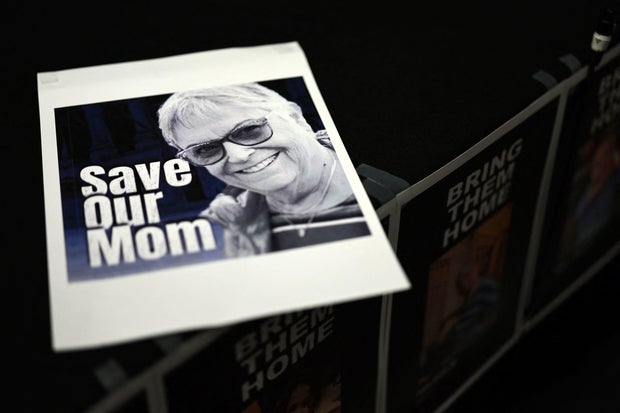CBS News
Freed Israeli hostage recounts ordeal in Gaza, where she says she was held in a hospital and civilian homes

Former Israeli hostage Ada Sagi, 75, who was kidnapped by the Hamas-allied group Islamic Jihad on Oct. 7 last year, said she was held in both civilian homes and a hospital in and around the city of Khan Younis in Gaza before she was released as part of an exchange for Palestinian prisoners in November 2023.
In an interview aired Wednesday, Sagi told CBS News partner network BBC News that she was taken by two kidnappers on a motorcycle from her home in Kibbutz Nir Oz into Gaza on Oct. 7. She said she was forced to leave her shoes behind, and her foot was badly burned by the exhaust pipe of the bike. She said she was put between her two captors on the motorcycle, one of whom had a Kalashnikov.
When they got into Gaza, she said she was put into a car and told by her kidnappers that they were from Islamic Jihad, which, like Hamas, has long been designated as a terrorist group by Israel and the U.S. She said she was informed that her captors wanted to keep her to use in a potential prisoner swap. Sagi and another female hostage were brought to a family home where children lived, where they were given food and a doctor was brought to look at her burn, she said.
HENRY NICHOLLS/AFP via Getty Images
“Then we started to hear the bombs from the Israeli army. I was very terrified, because I know the bombs from the other side, from Nir Oz, but on this side it was very terrifying. All the house was shaking,” Sagi told the BBC.
The next day, Sagi and the other hostage were moved from the east of Khan Younis to an apartment in the center of the city.
“You feel it was arranged, all the apartment, for hostages. The owner of the apartment and two guard[s] were students that needed money. I heard they say it’s 70 shekel [about $19] for a day. It’s a lot of money in Gaza,” Sagi said. “From the beginning, the owner of the apartment said: ‘You are like my mother. You are old and I take care for you.’ I didn’t believe, but it was like this because he gave me the medication for the foot. They try to keep us with good health, but the foot was not okay and I was very weak.”
Sagi said that on the 49th day of her captivity, she was brought to the southern city of Rafah for an expected prisoner exchange, but there was a delay, so she was brought back to a hospital in Khan Younis where she was told she would spend the night.
She said there were “17 people from Nir Oz in several rooms” being held by militants at the hospital.
“People that are saying that they are no[t] involved — they are involved. They’re getting money from Hamas. Our housekeeper’s the same. He get the money. And I ask him: ‘You say you are not Hamas, you are not [Islamic] Jihad. What? You take my freedom, and I am here?'” She said the housekeeper responded: “‘I want to buy visa for my children and my wife to go out from Gaza.'”.
“They have no money. So much poverty there,” she told the BBC.
Sagi said the world’s reaction to the war between Israel and Hamas has made her “crazy.”
“Every time, in every war, antisemitism raise her head. But this time, it’s worse,” Sagi said. “The world hates us, and I think they don’t know the truth.”
Sagi said her community has been destroyed.
“It was like Holocaust, but in the Holocaust, we have no army. You have no Israel. Now, we have Israel,” she said.
Sagi said for many years she taught Arabic in schools to promote peace in the region, but her time as a hostage made her believe the future she envisioned is no longer possible.
“I understood the Hamas don’t want it. Also, people who believe in peace are afraid from Hamas. No chance to do something with them,” she said. “Israel has to do the deal, what Biden and Bibi saying, to stop the war, bring back home all these hostages who is alive and who is dead.”
CBS News
Here Comes the Sun: Jack Antonoff and more

Watch CBS News
Be the first to know
Get browser notifications for breaking news, live events, and exclusive reporting.
CBS News
Capturing Moriah Wilson’s Killer – CBS News

Watch CBS News
Be the first to know
Get browser notifications for breaking news, live events, and exclusive reporting.
CBS News
How to watch the Minnesota Vikings vs. Chicago Bears NFL game today: Livestream options, more

Getty Images
The Minnesota Vikings will take on the Chicago Bears today. The Vikings are currently 8-2, an impressive run so far this season, and will be looking to add a fourth win to their current streak after last Sunday’s 23-13 win against the Tennessee Titans. The Bears, on the other hand, are entering this game on the heels of a four-game losing streak after a tough 20-19 loss against the Green Bay Packers last Sunday.
Here’s how and when you can watch the Vikings vs. Bears game today, whether or not you have cable.
How and when to watch the Minnesota Vikings vs. Chicago Bears
The Vikings vs. Bears game will be played on Sunday, November 24, 2024 at 1:00 p.m. ET (11:00 a.m. PT). The game will air on Fox and stream on Fubo and the platforms featured below.
How and when to watch the Minnesota Vikings vs. Chicago Bears game without cable
You can watch this week’s NFL game on Fox via several streaming services. All you need is an internet connection and one of the top options outlined below.
Fubo offers you an easy, user-friendly way to watch NFL games on CBS, Fox, NBC, ABC, ESPN, and NFL Network, plus NCAA football channels. The Pro tier includes 200+ channels and unlimited DVR, while the Elite with Sports Plus tier adds NFL RedZone and 4K resolution. New subscribers get a seven-day free trial and all plans allow streaming on up to 10 screens simultaneously.
You can watch today’s game with a subscription to Sling’s Orange + Blue tier, which includes ESPN, ABC, NBC, and Fox. The plan offers 46 channels with local NFL games, nationally broadcast games and 50 hours of DVR storage. For complete NFL coverage, add Paramount+ to get CBS games, or upgrade with the Sports Extra add-on for additional sports channels like Golf Channel, NBA TV and NFL RedZone.
Watching NFL games, including Fox broadcasts, is simple with Hulu + Live TV, which includes 90 channels, unlimited DVR storage, and access to NFL preseason games, live regular season games and studio shows. The service includes ESPN+ and Disney+ in the subscription.
Want to watch today’s game live on your smartphone? If so, NFL+ streaming service is the solution you’re looking for. It lets you watch NFL Network and out-of-market games on mobile devices, with an upgrade option to NFL+ Premium that includes NFL RedZone for watching up to eight games simultaneously. Note that NFL+ only works on phones and tablets, not TVs.









